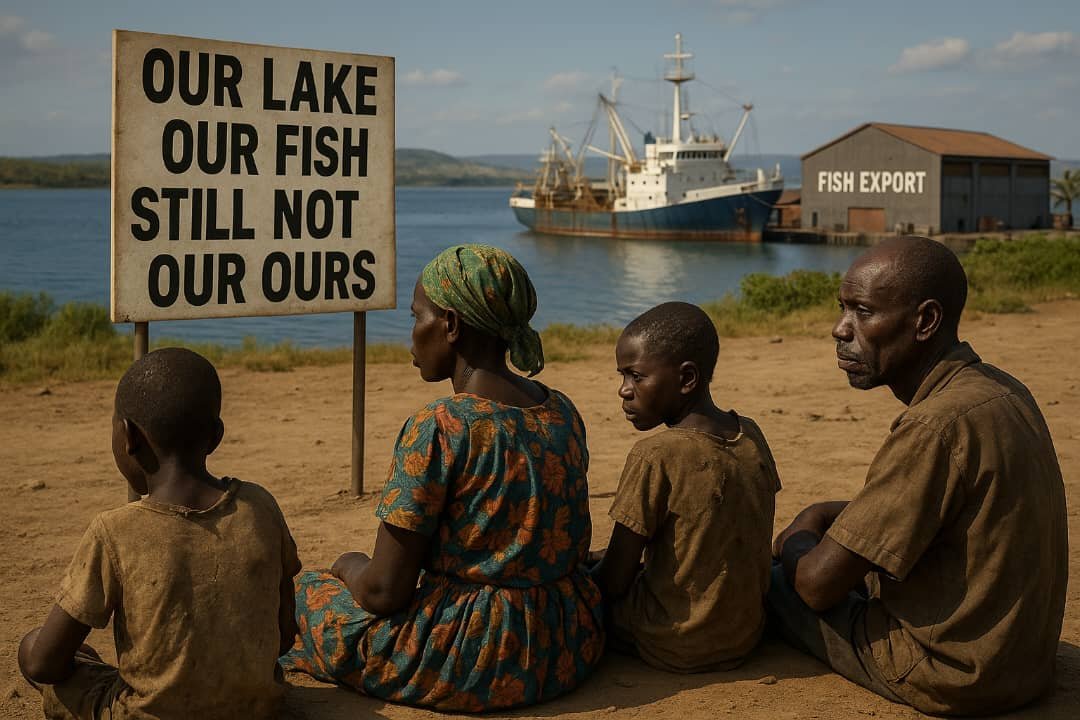By Isaac Christopher Lubogo
I. Prologue: A Nation Drowning in Its Own Abundance
There is something painful about hunger at a feast. Something tragic about poverty by the lakeshore. Something treasonous about exporting prosperity while importing suffering.
This is the paradox of Lake Victoria—Africa’s largest freshwater lake, the pride of Uganda’s southern flank, the watery cradle of generations. We sing its praises in anthem and folklore. We call it our lake. But the truth glares like sun on open water: our lake, our fish—but never truly ours.
II. The Vanishing Inheritance: From Custodians to Criminals
For centuries, lakeside communities in places like Katosi, Buvuma, Masese, and Kalangala lived symbiotically with the waters. Fishing was more than a trade—it was identity, inheritance, and sacred ritual.
But today, a cruel reversal is unfolding. Fishermen are now fugitives. Canoes are burned. Nets are confiscated. Men are whipped in the name of conservation while foreign trawlers, licensed by the state, plunder the depths.
Where once a boy could cast a net and feed his family, now he must bribe, beg, or risk arrest. The lake remains, but access has been militarized. The fish remain, but the people are locked out.
III. The Hypocrisy of Export Without Equity
According to the Uganda Bureau of Statistics (UBOS, 2024), fish and fish products earned Uganda USD 170 million (UGX 650 billion) in export revenue. Nile perch alone accounts for nearly 90% of that figure, bound for Europe, the Middle East, and Asia.
Yet back home:
A kilogram of Nile perch is unaffordable to the very fishermen who catch it.
Fishing households survive on UGX 10,000–30,000 per week, while exporters profit in billions.
Less than 5% of the fish value chain remains in local hands (FAO, 2023).
This isn’t development. It is organized exclusion.
It is the state celebrating foreign exchange while its own children boil fish bones for soup.
IV. Global Benchmarks: What Others Do Differently
Uganda need not reinvent the wheel. Other nations have mastered inclusive and sustainable fisheries. Consider:
Iceland, where fish exports contribute 11% to GDP—but with 90% of the value chain controlled by locals. Fishermen are empowered, not persecuted.
Namibia, where government policy mandates that all fish be processed locally before export. Community quotas are issued to local cooperatives, boosting fishermen’s incomes by over 200% (World Bank, 2022).
Indonesia, which reserves near-shore zones for small-scale, community fishing. This reform added USD 4 billion to GDP over ten years, while reducing overfishing (FAO, 2021).
Uganda, by contrast, earns revenue—but leaks dignity.
V. GDP Potential: What the Lake Could Deliver
Let us imagine a just, locally anchored system. One where:
Fishermen process their own catch.
At least 25% of fish stays for domestic consumption.
Taxes from fish exports are reinvested in lake communities.
Projected Economic Impact (Annual Estimates):
Sector Value in UGX USD Equivalent
Community processing & value-addition UGX 300 billion USD 80 million
Domestic market supply UGX 180 billion USD 48 million
Employment & MSMEs UGX 150 billion USD 40 million
Cooperative tax revenue UGX 20 billion USD 5.3 million
> Total Local GDP Potential: UGX 650 billion (USD 173.3 million)
Ironically, this is nearly equal to current export earnings—but with the added benefit of grassroots empowerment, food security, and local wealth circulation.
Instead, this value is siphoned away:
By foreign-owned processing firms.
Through corruption at landing sites.
Via export policies that prioritize foreign demand over national need.
VI. The Militarization of Hunger
The deployment of the UPDF Fisheries Protection Unit, while portrayed as conservation, has become a tool of fear. Fishermen are not just regulated—they are hunted.
While locals are beaten for using “illegal” nets, commercial boats operate unchecked under political patronage. These double standards reflect a dangerous economic apartheid: the lake is protected not for the people, but from the people.
This is not conservation. It is colonialism wearing camouflage.
VII. Toward Redemption: What Must Be Done
Uganda must reclaim its lake—not just physically, but ideologically. That requires bold, structural reform:
1. Community Quota System
Allocate fishing zones and licenses to registered community cooperatives.
Empower youth and women-led fishing enterprises.
2. Mandatory Local Processing
Enforce domestic processing before export.
Provide cold storage, packaging tech, and subsidies to local processors.
3. Domestic Consumption Priority
Reserve 25% of the catch for local markets.
Introduce fish into school feeding programs and public institutions.
4. Demilitarize, Decentralize
Replace UPDF enforcers with civil lake stewards trained in ethics, ecology, and local law.
Establish a Fisheries Ombudsman to report abuse.
5. Revenue Reinvestment
Pass a Lake Resource Benefit-Sharing Act to allocate fish revenue to infrastructure, schools, and health centers in lake regions.
VIII. Epilogue: The Fish Must Come Home
There is something profoundly unjust about a man who lives on the shores of abundance yet eats hunger. There is something prophetic about a nation that exports its future while mortgaging its soul.
Lake Victoria is not just a body of water. It is a test of whether Uganda is willing to honor the dignity of its people—or continue selling its inheritance for temporary gain.
> Until the lake feeds its children,
Until the fisherman becomes the first, not last,
Until policy bows to people and not profit—
We shall continue to cry:
Our lake.
Our fish.
But never truly ours.
Cited Data & Sources
Uganda Bureau of Statistics (UBOS), Statistical Abstract, 2024
Food and Agriculture Organization (FAO), State of World Fisheries, 2023
World Bank Report on Namibia Fisheries, 2022
Ministry of Agriculture, Animal Industry and Fisheries (MAAIF), Fisheries Policy, 2020
Fisheries Training Institute Entebbe, Internal Report, 2023
World Economic Forum: Blue Economy & African Sovereignty, 2022
# Suigeneris








